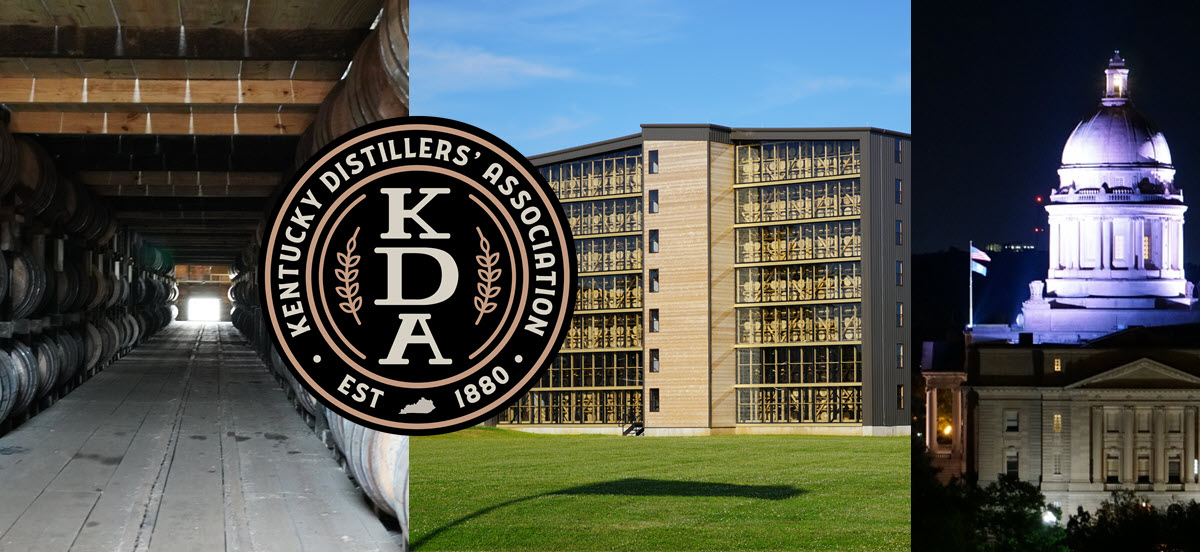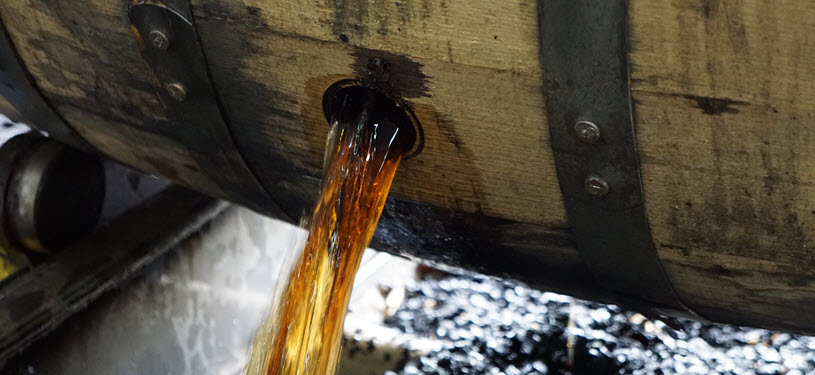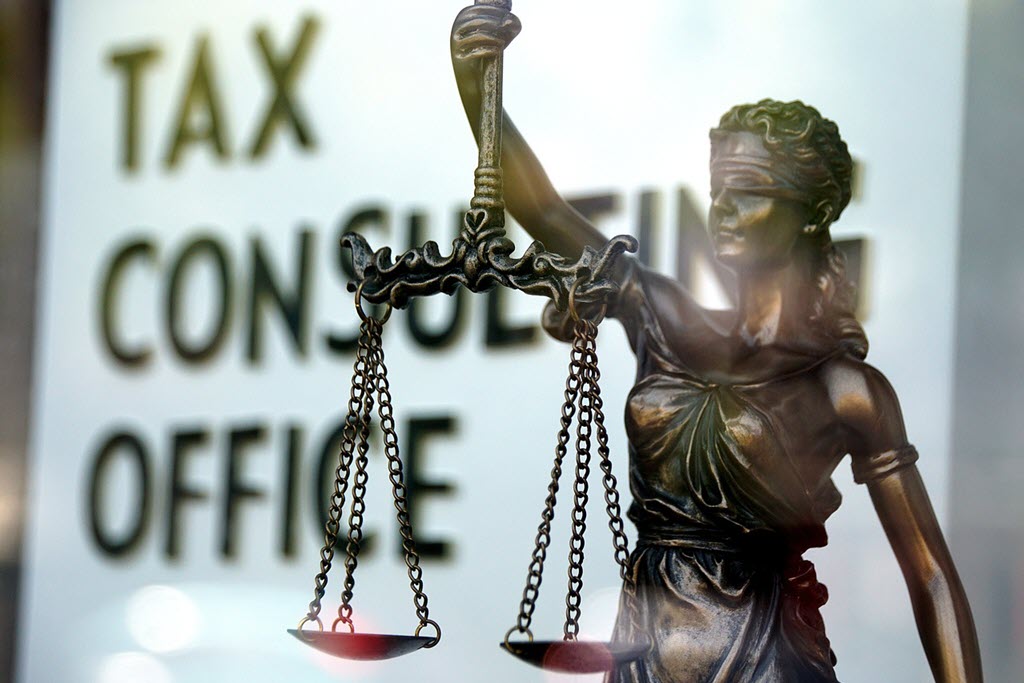
On May 4, 1964, the United States Congress by a majority vote passed a concurrent resolution that said, “Bourbon Whiskey is a Distinctive Product of the United States.” With the passage of that law it was made clear that any state in the country could legally make bourbon whiskey.
Fast forward to today and according to the Kentucky Distillers’ Association – KDA, Kentucky is home to 95% of the world’s bourbon inventory. In fact, according to data they shared a few months back, the state is home to 11.4 million barrels of aging bourbon. The total number of aging barrels exceeds 12 million when you add in brandy and other spirits.
Kentucky is the Only State in the U.S. That Taxes Aging Barrels

Unlike the other 49 states, Kentucky is the only state to get charged a tax on every barrel of aging spirits. That tax is now costing distillers something in the neighborhood of $40 million annually and growing.
“We’re thrilled that our homegrown and historic [bourbon] industry continues to flourish, but these numbers could have been much higher if Kentucky didn’t have a major barrier to entry for new distilleries in the form of this barrel tax,” said Kentucky Distillers’ Association President Eric Gregory.
The KDA has asked that the General Assembly to remove the barrel tax, as it is a barrier to entry for new distillers wanting to establish their operations in Kentucky.
A Discriminatory Barrel Tax
To address the issue of what the Gregory calls a ‘discriminatory barrel tax’ the association is working with state representatives. In June 2022, the Kentucky General Assembly launched the Bourbon Barrel Taxation Task Force to address the issue.
At one of the meetings KDA representative Chris Nolan testified that ,”Kentucky… is the only jurisdiction in the world that taxes aging spirits… that the barrel tax is the ad valorem property taxes at the state and local level. The barrel tax is a discriminatory tax that no other jurisdiction levies. It is a product of the administration from decades ago and from court cases that have determined that after two years a barrel in a warehouse is a finished good. The barrel tax credit was established in 2014, when the General Assembly made the policy decision to refund the barrel taxes. The bourbon barrel tax reinvestment credit was created. Initially the tax credit was working well, and distilleries were reinvesting in our properties. Now, there aren’t enough credits available to offset the rising barrel taxes. Some distilleries are getting only a small percentage on the dollar. The credits carry forward, but are accumulating at a rate that the industry will never be able to realize or to monetize.
“The industry asks that the General Assembly remove the barrel tax, as it is a barrier to entry for new distillers wanting to establish their operations in Kentucky.”
The Barrel Tax is Sending Startup Distilleries to Other States
“We have been and continue to be transparent in all these discussions and have been for 15 years,” said Gregory at one of the Bourbon Barrel Taxation Task Force meetings. “In my tenure, we’ve been discussing a way to address the barrel tax since 2008. It’s an issue that is discriminatory and almost singular to Kentucky because we are the only place in the world that taxes aging barrels of spirits. And it is a tax that is specific to bourbon because we age bourbon, you don’t age vodka, you don’t age gin and you don’t age rum but you do age bourbon.
“We understand and respect that this is a tough and complicated issue for everyone involved. There are millions of dollars at stake. The barrel tax revenue has skyrocketed from less than $14 million in 2014 to $40 million this year. But one thing that we cannot afford to do is not address this mounting problem.
“It has become painfully clear that the barrel tax is turning away new distilleries from Kentucky and sending them to competitors states.”
Based on current trajectory, revenue from the barrel tax is expected to double every six to seven years.
House Bill 5 Proposes Sunsetting of Barrel Tax

On February 23, 2023 Kentucky Representative Jason Petrie and Speaker of the House Representative David W. Osborne introduced House Bill 5, AN ACT relating to property tax on distilled spirits.
This first draft of the bill recommends that Kentucky’s barrel tax be sunsetted over the next 16 years. We at DistilleryTrail are not tax experts by any means but in layman’s terms, starting in 2026 the tax would be reduced by 3% per year in the early years then the percent would grow over the years until it would be totally eliminated by January 1, 2039. The full table from the proposal is listed below if you want the details. Keep in mind that this is the first draft presented by legislatures so it is highly likely to change many times before it comes up for a full vote.
Kentucky Distillers’ Association Puts Out a Statement about House Bill 5
In response to House Bill 5 the Kentucky Distillers’ Association and its 52 member distilleries put out the following statement. There are 70 plus distilleries in the state but not all distilleries are members of the Association. Here is the Associations statement.
“Eliminating the job-killing inventory tax on aging barrels requires consideration of the distilleries that pay it and the local communities that benefit from it.
Kentucky’s signature Bourbon industry believes the phase-out schedule in House Bill 5 ultimately benefits local communities across Kentucky by more than doubling the industry’s tax before any reduction occurs.
In fact, most local communities will see no reduction from current revenues for at least the next 10 years.
While the bill will initially and significantly increase our tax liability, we appreciate the leadership of A&R Chairman Jason Petrie and Speaker David Osborne to put forth a proposal to slowly phase out the discriminatory tax.
The success or failure of House Bill 5 will determine whether Kentucky’s distilling industry continues to call the Commonwealth home, bringing jobs and tax revenue as it grows, or whether it is forced to look at other states for future growth or even potentially relocating existing facilities.
Thank you to the legislature for addressing this crisis. It is imperative that the Kentucky General Assembly end the tax on a $9 billion homegrown industry that employs 22,500 Kentuckians and attracts millions of tourist visits to Kentucky each year.”
*This statement is provided by the Kentucky Distillers’ Association on behalf of its 52 member companies.
February 27, 2023
We will keep you informed of progress on this bill.
Related Story – The Number of Bourbon Barrels Aging in Kentucky Hits a Record High of 11.4 Million Barrels
View all Kentucky Distilleries.
View all U.S. Distilleries.
Excerpt of Kentucky House Bill 5
UNOFFCIAL COPY 23 RS BR 1754 1 AN ACT relating to property tax on distilled spirits. ... 11 (2) There shall be exempt from state and local ad valorem taxes a portion or all of 12 the property taxes assessed on distilled spirits stored or aging in barrels located in 13 a bonded warehouse or premises, excluding neutral spirits, according to the 14 following schedule for distilled spirits assessed on: 15 (a) January 1, 2026, three percent (3%) of the tax; 16 (b) January 1, 2027, six percent (6%) of the tax; 17 (c) January 1, 2028, nine percent (9%) of the tax; 18 (d) January 1, 2029, thirteen percent (13%) of the tax; 19 (e) January 1, 2030, seventeen percent (17%) of the tax; 20 (f) January 1, 2031, twenty-one percent (21%) of the tax; 21 (g) January 1, 2032, twenty-six percent (26%) of the tax; 22 (h) January 1, 2033, thirty-two percent (32%) of the tax; 23 (i) January 1, 2034, thirty-eight percent (38%) of the tax; 24 (j) January 1, 2035, forty-four percent (44%) of the tax; 25 (k) January 1, 2036, fifty percent (50%) of the tax; 26 (l) January 1, 2037, sixty-five percent (65%) of the tax; 27 (m) January 1, 2038, eighty percent (80%) of the tax; and 1 (n) January 1, 2039, and thereafter one hundred percent (100%) of the tax
Please help to support Distillery Trail. Sign up for our Newsletter, like us on Facebook and follow us on Instagram and Twitter.




